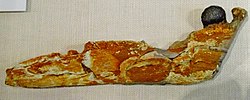Tholodus is an extinct genus of basal ichthyopterygian known from the Middle Triassic (mid-late Anisian to late Ladinian stage) of Germany, northeastern Italy and possibly China. It was first named by Christian Erich Hermann von Meyer in 1851 and the type species is Tholodus schmidi.[1] It is known from many disarticulated and fragmentary remains, mainly teeth and jaw fragments. Most specimens were collected from various localities across the Ladinian-aged Muschelkalk, Germany, mainly from the Jena Formation of the upper Lower Muschelkalk, where the holotype was found. Dalla Vecchia (2004) recently described two additional specimens, a mandibular ramus and a maxilla, both bearing teeth and nearly uncrushed, and some postcranial remains, from a single late Anisian outcrop, from the southern Alps of Italy. The humerus resembled that of immature individuals of the Asian genus Chaohusaurus, suggesting possible affinities to Grippidia.[2]
| Tholodus Temporal range: Middle Triassic,
| |
|---|---|

| |
| Jaw | |
| Scientific classification | |
| Domain: | Eukaryota |
| Kingdom: | Animalia |
| Phylum: | Chordata |
| Class: | Reptilia |
| Order: | †Ichthyosauria |
| Genus: | †Tholodus von Meyer, 1851 |
| Type species | |
| †Tholodus schmidi von Meyer, 1851
| |
| Synonyms | |
| |

Jiang et al. (2008) described and named Xinminosaurus from the mid-late Anisian Guanling Formation of Guizhou, China.[3] Maisch (2010) suggested that Xinminosaurus might be a subjective junior synonym of Tholodus. Although Jiang et al. (2008) regarded Tholodus to be a possible nomen dubium, Maisch (2010) rejected this opinion, stating that Tholodus is easily recognized and characterized by unequivocal dental autapomorphies, so that even jaw and tooth fragments are diagnostic, and it is thus a valid taxon. Furthermore, he noted that Tholodus is clearly distinguishable from all other known marine reptiles except Xinminosaurus. The only difference between the taxa, according to Maisch (2010), is that Tholodus specimens are at average twice as large as Xinminosaurus holotype.[4]
References
edit- ^ von Meyer, H (1851). "Fossile Fische aus dem Muschelkalk von Jena, Querfurt und Esperstadt". Palaeontographica. 1: 195–208.
- ^ Fabio Marco Dalla Vecchia (2004). "First record of the rare marine reptile Tholodus schmidi from the Middle Triassic of the Southern Alps". Rivista Italiana di Paleontologia e Stratigrafia. 110 (2): 479–492.
- ^ Jiang, D.; Motani, R.; Hao, W.; Schmitz, L.; Rieppel, O.; Sun, Y.; Sun, Z. (2008). "New primitive ichthyosaurian (Reptilia, Diapsida) from the Middle Triassic of Panxian, Guizhou, southwestern China and its position in the Triassic biotic recovery". Progress in Natural Science. 18 (10): 1315. doi:10.1016/j.pnsc.2008.01.039.
- ^ Michael W. Maisch (2010). "Phylogeny, systematics, and origin of the Ichthyosauria – the state of the art" (PDF). Palaeodiversity. 3: 151–214.